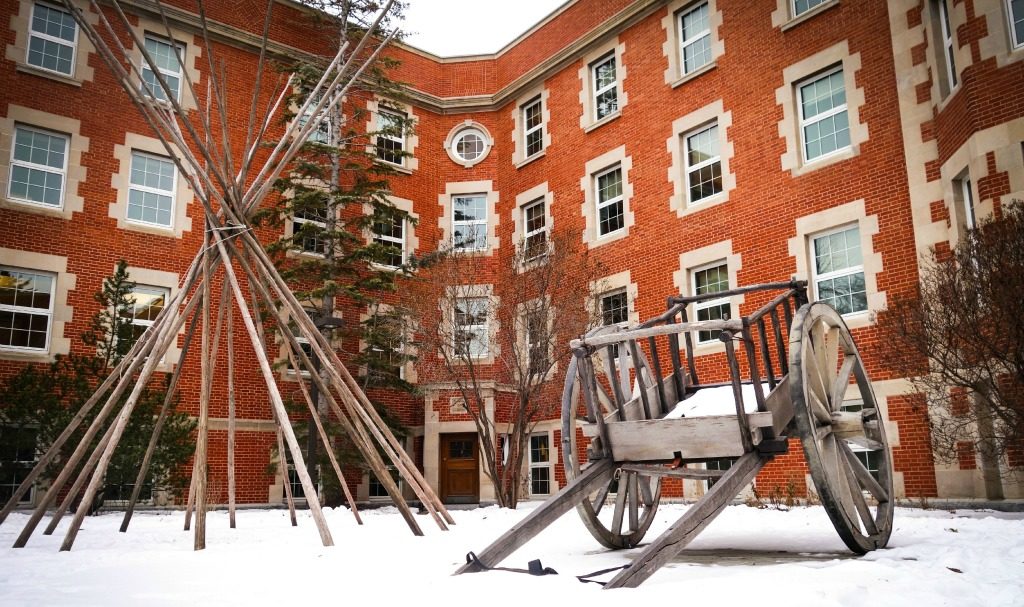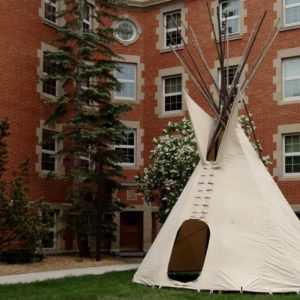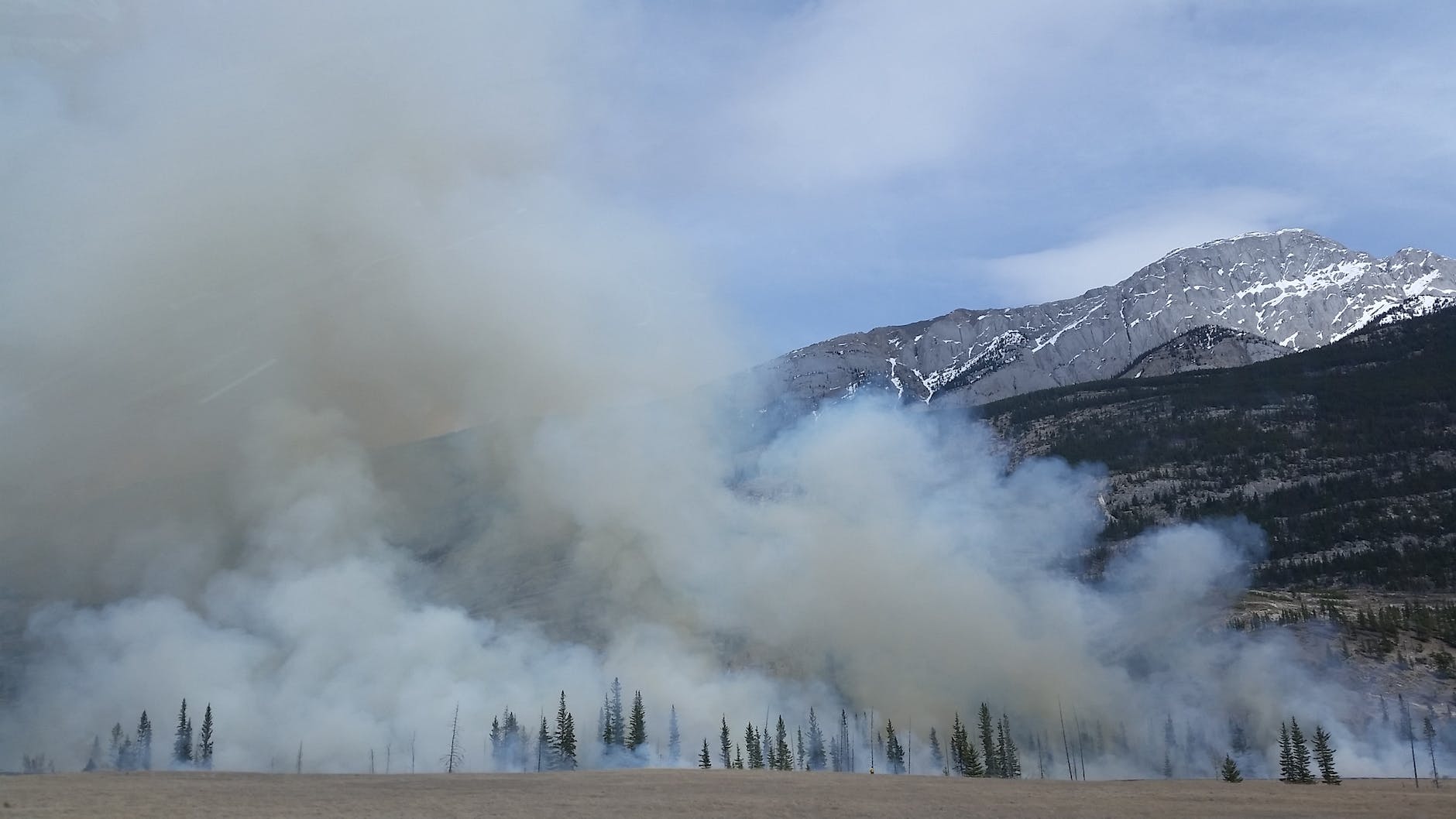I get asked to talk about Indigenous issues a lot, and since the Truth and Reconciliation Commission released its final report, the whole concept of “reconciliation” has become a hot ticket notion. Invariably during the Q&A sessions, people ask, “what can I do?”
I’m a big fan of having at least a short list of concrete answers to that question. Things like: ask what Indigenous communities want and what kind of support they need, and do that.
However, many times people want more specific instructions. So this post is about that. Specifically, one way you can help is to support students taking Native Studies.
 As a first generation university student, there is so much about the university I just don’t know yet. I feel like I am always just stumbling around bumping into things and making mistakes because I don’t know where I’m going or what I’m doing. I have done all my degrees at the University of Alberta because this is the post-secondary institution that is within my territory, and keeps me close to my family and community.
As a first generation university student, there is so much about the university I just don’t know yet. I feel like I am always just stumbling around bumping into things and making mistakes because I don’t know where I’m going or what I’m doing. I have done all my degrees at the University of Alberta because this is the post-secondary institution that is within my territory, and keeps me close to my family and community.
I made it through my Bachelor of Education, and have been teaching on and off for about 15 years. I did my law degree here too. I felt incredibly isolated and unsupported during those degrees, adrift in what felt like very hostile environments as an Indigenous student. Coming to the Faculty of Native Studies has been a life-changing experience. Here I feel supported, challenged, excited…and part of something really important. I am in awe of my colleagues and the work they do, but more than that, I am finally in a place where I do not have to defend myself and my existence constantly. The programs here are rigorous, intellectually diverse, and so so so necessary.
I recently found out that the Faculty of Native Studies here at the University of Alberta (the only Faculty of Native Studies in North America!), has next to no funding base. Okay first I had to learn that having a funding base is a normal thing for most faculties.
Big faculties bring in MILLIONS of dollars in alumni donations, corporate gifts and sponsorships, etc. Forgive me if this is all obvious and not at all new to you. I’d never thought about it; my family doesn’t exactly run in those circles. People even name programs as beneficiaries in their wills!
The Faculty of Native Studies is a relatively new faculty. The School of Native Studies opened in 1984, but we did not become a faculty until 2006! Since then we’ve added an MA and PhD program. We’re a small, but mighty faculty, despite not having deep pockets to reach into.
I’m busy just trying to navigate my MA, so I never turned my mind to fundraising because I’ve never done it and I don’t have a bunch of rich philanthropist buddies anyway.
 But then I found out that you don’t have to be uber rich, or even regular rich to help out Native Studies students. Someone could donate $84 a month for a year, for example, and that would end up as a bursary of $1000 for a student. Nothing to sneeze at! I have been the recipient of “small” bursaries of $1000 or less a few times during my degrees, and holy cats it makes a huge impact! Especially at the leanest times of the year (like now). You can name your award/bursary, and you can decide on the criteria if you’d like. It’s kind of wild!
But then I found out that you don’t have to be uber rich, or even regular rich to help out Native Studies students. Someone could donate $84 a month for a year, for example, and that would end up as a bursary of $1000 for a student. Nothing to sneeze at! I have been the recipient of “small” bursaries of $1000 or less a few times during my degrees, and holy cats it makes a huge impact! Especially at the leanest times of the year (like now). You can name your award/bursary, and you can decide on the criteria if you’d like. It’s kind of wild!
I’m thinking of setting one up for parents in the Native Studies program. Because I remember subsisting on ramen and raw oatmeal (eat a handful and it makes you *feel* full for a while) so that my kids could have fruit and meat. Getting a thousand smackarooneys in those super lean times made a huge difference and I’ll never forget it.
That’s something I can do. That’s something a lot of folks can do. Set up “small” but impactful bursaries to support our students, many of whom are also first generation University students. Also apparently there are a fair number of employers who will match these donations, sometimes doubling the amount you can get to students! You just need to ask them about it. And there are tax benefits for you of course.
Then I learned about another option I never in a million years thought would be something I could do: create an endowment. Sounds like a rich person thing, right? And don’t get me wrong, it is a big chunk of money; minimally $25,000. But you can put $5000 in annually for 5 years. It blows my mind that there are people out there giving way more than this to other faculties like it’s not big deal, but nevermind that. When you hit that $25,000, the award or bursary comes from the interest, so the endowment exists forever. (Again something I didn’t know anything about.)
I mean, I don’t have an extra $5000 a year. No one I know does. Except… I was thinking, if I did a few extra talks this year and the next four, and put my speaker’s fees towards this…I could be supporting a student a year in Native Studies with some much needed funds…forever. Like every. Single. Year.
This is a concrete step folks can take to support Native Studies students. There are of course other huge options out there, but I feel like the kind of people who can afford to make those huge gifts and endowments probably already know all about this stuff. I’m thinking more of regular folks who have a tiny little bit of disposable income and want to make a difference with it. I had no idea that folks in that category could do so much for students…but they can.
If you’re interested in supporting students at the Faculty of Native Studies at the University of Alberta, you can contact Della Paradis She is with the Faculty Development Office of Advancement and can be reached by email or phone:
della(at)ualberta.ca
Ph. (780) 492-7537
So there you go. A concrete way folks can make a direct and tangible impact. Don’t say I never give you real life suggestions!
Native Studies:
- Is an emerging area of study that seeks to understand the experiences and the lives of Aboriginal people and communities, past, present and future
- Researches how Aboriginal communities and the countries in which they live influence and define each other
- Pursues ways of understanding Aboriginal communities — local, national and global
- Combines the insights of many traditional university disciplines, such as anthropology, history, law and sociology, with the wisdom of Indigenous knowledge and perspectives; this approach challenges mainstream ideas about Aboriginal people
- Suggests fundamentally new ways of understanding Aboriginal people and their relations with non-Aboriginal societies and governments
- Aims to build bridges that will help create a better Canada


12 Comments
Kerri Wall · December 20, 2017 at 12:18 pm
Brilliant! I’m sharing this on FB 🙂 Thankyou.
Audrey Lawrence · December 20, 2017 at 12:37 pm
Great article! I had already planned on setting up an endowment in my son’s name at Algonquin College. They do a special Aboriginal Graduation there for Indigenous students and he was very proud to be part of that in 2014, but unfortunately, passed away last year. Your article certainly reinforcement that. Being a staving student as well in the past, I also fully remember how grateful I was when a got a letter from home or a relative with a small cheque or money in it.
âpihtawikosisân · December 20, 2017 at 1:09 pm
I’m so sorry for your loss. Setting up an endowment to honour him is so beautiful!
michaelmurphy089 · December 20, 2017 at 1:41 pm
Thanks for writing about this, it is something I would certainly like to do if my circumstances take a better turn.
Poetry Pocket · December 20, 2017 at 3:59 pm
Doesn’t Trent University in Peterborough Ontario have a special Native Studies program?
âpihtawikosisân · December 21, 2017 at 10:51 am
So depending on the institution, there are different “levels” of sorts (I’m just learning all this!). Remember where I said that the Faculty of Native Studies used to be a School of Native Studies? That was close to being a Faculty, but not quite.
I think of it this way. You’ve got the whole University, which is divided up into Faculties (like Business, Arts, Medicine, Law, etc). Within the Faculties, there are often Departments. So for example in the Faculty of Arts there is usually a Department of Political Science. Then you might have a specific program like a Bachelor of Arts with a major in Political Science.
Then there are Centres or Institutes, like a Centre for Constitutional Studies (within the Faculty of Law) that focus even more specifically on certain things, usually research-based, that students can access or be helped by.
Faculties have to be self-supporting as much as possible, but departments and programs get their funding from the faculties they are housed within.
There are many Departments of Native Studies (or other related names) throughout North America, but just one Faculty. So far.
Troy · December 21, 2017 at 5:18 am
This is a great article, but you say that you the University if Alberta is the only Faculty of Native Studies in North America, which makes me wonder how you classify the faculties at The University of Montana and The University of Arizona.
Cheers,
Troy
âpihtawikosisân · December 21, 2017 at 10:38 am
The University of Montana has a Department of Native Studies within the College of Humanities and Science. (http://hs.umt.edu/nas/)
The University of Arizona has a Program of American Indian Studies within the College of Social and Behavioural Sciences. (https://ais.arizona.edu/)
There are many Departments and Programs of Native Studies/American Indian Studies/Indigenous Studies etc throughout North America. I literally only learned the difference between a Department and a Faculty (or College) last year, so this distinction is super new to me and there is still a lot about this I just don’t grasp. The most pertinent difference with regards to this post is that these departments are housed within wider faculties/colleges that area old, well-established, and tend to have large sources of funding already in place.
Faculties/colleges control their own budgets, including the monies that flow to departments and programs, and so they generally have Offices of Advancement set up that do nothing but raise funds. Departments and programs rely on the funds flowed to them by the faculty/college.
The Faculty of Native Studies at the U of A isn’t the oldest or the biggest doing this work, but it is unique as a Faculty. As a result, it is expected to be self-supporting in a way that departments and programs are not. Because it is such a young faculty, it just does not have the long-standing donors and supporters (from the public and industry) that other faculties (like the Faculty of Business) have. Those faculties bring in millions of dollars a year from donors. The Faculty of Native Studies brings in a few thousands!
Wendy · December 21, 2017 at 3:16 pm
Great info here David thank you for sharing
Walter · January 4, 2018 at 4:49 pm
As you pointed out there are many indigenous programs and departments throughout North America. I think you may owe it to everyone who reads your column to consider writing something on that very subject to show people why the U of A program is unique. I think a prominent magazine does an annual report on Colleges and Universities across Canada. Why not a critique of Indigenous study programs and departments across Canada? But more to a point aren’t we all Indigenous now? The Faculty of Business is never called the Faculty of Exchanging Money (really what it’s all about) so maybe it’s time to consider Faculty of “Indigenous Studies” instead of Faculty of Native Studies. –U of C Alumni.
Nina | Lemons and Luggage · January 6, 2018 at 10:30 am
Hi Chelsea!
I have nominated you and ten other female bloggers from marginalized communities for the Sunshine Blogger Award: https://www.lemonsandluggage.com/blog/sunshine-blogger-award
Check it out if you have the time. 🙂
Gail Taylor · January 6, 2018 at 12:39 pm
Have you ever checked out https://www.trentu.ca/indigenous/? 50 years sounds impressive.